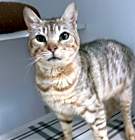Tonkinese cats stop growing around two years old and are a relatively fast-growing breed. Tonkinese cats typically reach their full height by nine to 12 months old and will continue to gain muscle mass and weight until their second birthday.
You’ll want to start transitioning them to adult cat food around their first birthday. This ensures they get the right nutrients to support their growth and maintain their health as they mature. Gradually mixing in the adult food with their kitten food over a week or so can help make this transition smoother.










